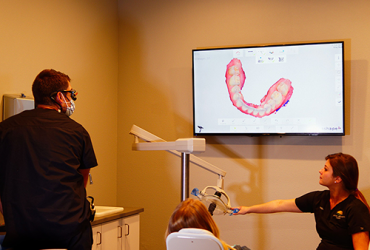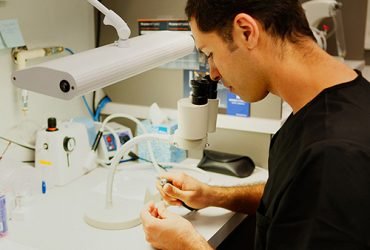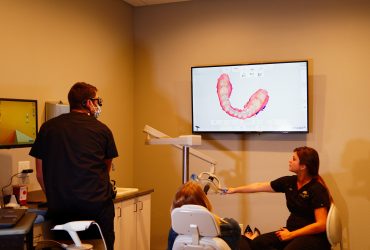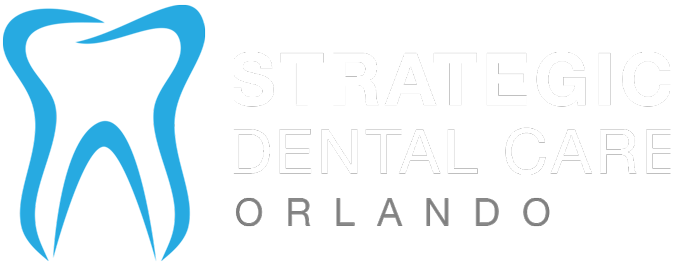
Dental Crowns
In either case, a dental crown, commonly known as a cap, can help restore the functionality, as well as the cosmetic value of the tooth, while making sure that the natural structure is preserved and protected. Different types of crowns are used to meet different purposes in the oral cavity – and our team is here to help you decide which one suits your needs best.
There are a number of factors that can render a healthy, natural tooth structurally or functionally weak and aesthetically compromised. Some of the most common cases in which dental crowns are advised include:
- Horizontal fractures of the teeth
- Chipped edges and margins
- Teeth affected by types of wear (Erosion, Attrition or Abrasion)
- Night-time teeth grinding, or Bruxism
- Following a Root Canal Treatment
- Previous silver or coloured restorations
- Permanent staining or discoloration
- Congential developmental anomalies of the Enamel and Dentin
- Cosmetic restoration of Diastemas (gaps between the front teeth)
- Cosmetic restoration of uneven or peg-shaped teeth
- Teeth affected by direct blow, trauma or accident
Crowns are used to strengthen and protect a tooth from further decay. They can be made from a variety of materials, specifically porcelain, porcelain fused to metal, or a full gold crown. In modern dentistry, a porcelain-finished crown creates the most natural look and feel and can easily be matched to the shade of your natural teeth. The more natural it looks, the better it will blend with your existing teeth.
The dental crown procedure requires at least 2-3 visits for completion. Here’s what you can expect from your appointment from start to end:
- In order to achieve ideal crown seating and cementation, it is necessary to trim the affected tooth down to a certain shape and size. During your first appointment, your tooth will be filed down with the help of a mechanical hand piece. Local anaesthesia is generally administered prior to this step to prevent any sensitivity, discomfort or pain that may arise during the procedure.
- Once the desired size has been achieved, an impression of the tooth as well as its surrounding soft tissues is taken to record fine anatomical details. At the same time, the shade of the natural teeth is noted down.
- The dentist may place a temporary crown on the tooth, and this brings an end to the first appointment.
- The shade number and the impression are sent to the dental laboratory where the crown is fabricated by technicians. It may take at least two weeks for the crown to get prepared – your next appointment will be scheduled accordingly.
- The next time you visit the office, the crown will be ready for trial. Local anaesthesia may be administered again to ensure a comfortable, stress-free appointment. The dentist will remove your temporary crown, clean and dry the prepared tooth, and then place the newly fabricated crown on top. You will be asked to close your mouth and bite normally to check for any raised edges, uneven bite or general discomfort.
- If the crown fits perfectly without any issues, the dentist will proceed to fixing it permanently in place with the help of a strong dental cement.
- If there are issues, the dentist will eliminate them at the office by chairside with the help of a hand piece or a sanding device.
Dental crowns can be fabricated using a variety of materials, most commonly metal, porcelain, Porcelain-Fused-to-Metal (PFM), and even gold. The ideal material is chosen based on three main factors:
- The location of the affected tooth in the oral cavity: For instance, a porcelain crown ideally cannot be used to restore a molar, or a tooth located in the posterior part if your mouth. This is because a high strength, high durability material is required to withstand the intraoral forces when you bite or chew your food. Metal or PFM is preferred in this case.
- Aesthetic value of the tooth: This consideration is taken into view if an anterior tooth is being restored. For a tooth that is fully visible when you smile, metal crowns are ideally not used because they can compromise dental aesthetics. In this case, preference is given to Porcelain or PFM crowns.
- Patient’s budget or Insurance Coverage: Metal is the cheapest of the lot, and therefore when there are financial concerns or limited insurance coverage – it becomes the material of choice for dental restoration.
These days, crowns are also being fabricated using Zirconia – which offers outstanding, unmatched cosmetic value, as well as remarkable strength.
How are dental crowns cleaned and maintained?
It is quite easy to clean a dental crown, and you can do it just the way you would clean your natural teeth. Use a toothbrush that is not too hard or abrasive, and a fluoride toothpaste to clean all corners of your teeth in a firm but nonaggressive manner. Do not skip flossing because this will allow for food debris, plaque and bacteria to accumulate between the teeth and the crowns.
Visit the dental office for routine check-up and clean appointment at least twice a year to have your fixed prosthesis professionally evaluated – and to make sure your natural tooth is not developing any secondary infections.
What are the advantages of opting for dental crowns for tooth restoration?
There are numerous benefits of opting for dental crowns to restore aesthetically or functionally compromised teeth, the most prominent of which include:
- Preservation of natural tooth structure
- Protection from further damage and fracture
- Prevention of secondary infections
- Complete functional restoration of the affected tooth in terms of biting, tearing off and chewing food, as well as refining speech in some cases
- Complete aesthetic restoration of the smile using tooth-coloured materials
- Avoiding extraction of a natural tooth, which can in turn lead to a number of complications
- Restoring strength and reliance to the affected tooth
Dental Crowns at Strategic Dental Care:
Strategic Dental Care offers an extensive range of services and treatments aimed at improving overall oral health. Our primary focus lies on making sure that your teeth and all surrounding supporting structures always remain in optimal health – that is how you will continue to smile wider and brighter for decades at a stretch.
We use only the finest, top-quality materials for the fabrication of our crowns to ensure unmatched durability, effective restorations, reliable protection of the underlying natural tooth, and most importantly, your 100% satisfaction every time. Our team of experts is always here to help you decide whether or not you require a dental crowns, and which particular material suits your needs best.
Remember, leaving a structurally compromised tooth in your mouth without seeking prompt treating can lead to further damage, and eventually, it may need to be extracted. Dental crowns help save natural teeth – and also save you a considerable amount of money that may otherwise have to be used in replacing the tooth.
If you have a broken, chipped, fractured or previously restored tooth in your mouth that you feel needs to be covered and protected – give us a call today. Simply dial 407-284-1645 and our team will be happy to address any questions or queries you may have regarding our services.
When you look in the mirror the next morning, you will have a brand new smile. Crowns are durable and should last a minimum of 10 years, with some lasting as many as 20 years. Care for your crown as you would your natural teeth. Brush and floss regularly and use an antiseptic mouthwash to rinse.
Contact Us
Call Strategic Dental Care today at 407.284.1645 to learn more about our procedures and how they can help restore your smile.









